| Srl | Item |
| 1 |
ID:
128898


|
|
|
| 2 |
ID:
102163
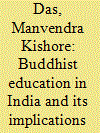

|
|
|
| 3 |
ID:
110288
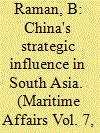

|
|
|
| 4 |
ID:
094028
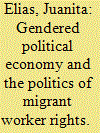

|
|
|
|
|
| Publication |
2010.
|
| Summary/Abstract |
Focusing on the South-East Asian region and looking specifically at activism around the position of migrant domestic workers in the region, this article seeks to evaluate why migrant activist organisations appear to have had, at best, modest influence on gendering the International Labour Organization's approach to labour rights. The author argues that this is largely due to how dominant understandings of labour rights have neglected the significance of social relations of reproduction (i.e. those 'care-related' activities associated with the household) to the functioning of the labour market. Furthermore, a transnationalisation of social relations of reproduction is manifested in the increased feminisation of labour migration in the region and this highlights further problems with dominant labour rights perspectives that remain largely state-centric in their approach. The significance of South-East Asian states in promoting localised regimes of citizenship/immigration and industrial relations greatly limits the ability of activist groups to claim and utilise the language of human rights. Nonetheless, the article argues that a concern with the human rights of female migrants can potentially destabilise dominant understandings of labour and human rights. More generally, the article seeks to demonstrate the insights that a critical feminist human rights approach can bring to studies of work and employment within international political economy.
|
|
|
|
|
|
|
|
|
|
|
|
|
|
|
|
| 5 |
ID:
120888
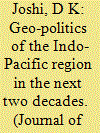

|
|
|
| 6 |
ID:
094026


|
|
|
|
|
| Publication |
2010.
|
| Summary/Abstract |
Why is it that the World Bank has failed to effectively incorporate the impact of regionalisation within its economic development strategies and policy advice for borrowing countries? This is an interesting puzzle given the increasing importance that scholarly observers, policy practitioners and development agencies have attached to regionalism and regionalisation in recent years. In the fiscal years 1995-2005, the World Bank provided only US$1.7 billion in support for regional (or multi-country) operations across the globe-this is less than 1 percent of its project and other funding overall. In South-East Asia, while the Asian Development Bank has had a particularly strong engagement with regionalism, the World Bank has only recently started to come on board with regional analysis and programs. The article proposes that the gap is due to a combination of institutional and ideological factors, and explores this proposition through a study of the World Bank in Vietnam.
|
|
|
|
|
|
|
|
|
|
|
|
|
|
|
|
| 7 |
ID:
116024


|
|
|
| 8 |
ID:
093702
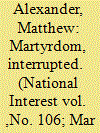

|
|
|
|
|
| Publication |
2010.
|
| Summary/Abstract |
THE SEVEN-year manhunt came down to this. In the wee morning hours of a September dawn, Noordin Mohammed Top, the most wanted terrorist in Southeast Asia, huddled in a burning house in central Java along with three of his men. The fire started when a round shot by police in the initial standoff ignited the fuel tank of a motorcycle inside the courtyard of the house, forcing Top to seek refuge in the bathroom, where he decided to make his final stand. Top believed that dying during what he considered to be legitimate jihad would earn him a seat in heaven, and taking a few apostate policemen with him would ensure a bonus reward in the afterlife. The Indonesian police had come close to catching Top before, but he proved to be an elusive, and lethal, fugitive. Perhaps this would be their moment of glory.
|
|
|
|
|
|
|
|
|
|
|
|
|
|
|
|
| 9 |
ID:
121668


|
|
|
|
|
| Publication |
2013.
|
| Summary/Abstract |
Scholars of civil-military relations have long been puzzled by the fact that despite a series of mutinies, Papua New Guinea (PNG) has never seen a full-blown military takeover. Indeed, when PNG became independent in the early 1970s, some veteran PNG watchers had predicted that the country was likely to follow in the footsteps of many coup-prone African countries. In this article, the authors highlight the reasons for the surprising absence of coups in PNG by comparing the country to three South-East Asian nations that have experienced coups. By contrasting PNG with Indonesia, Burma and Thailand, the authors identify five key factors that have prevented coups in the former and facilitated them in the latter: first, the role that the military played in the struggle for independence or modern statehood; second, the size of the armed forces; third, the military's organisational capacity; fourth, geographical conditions and the military's command structure; and finally, the general relationship between civilian and military elites.
|
|
|
|
|
|
|
|
|
|
|
|
|
|
|
|